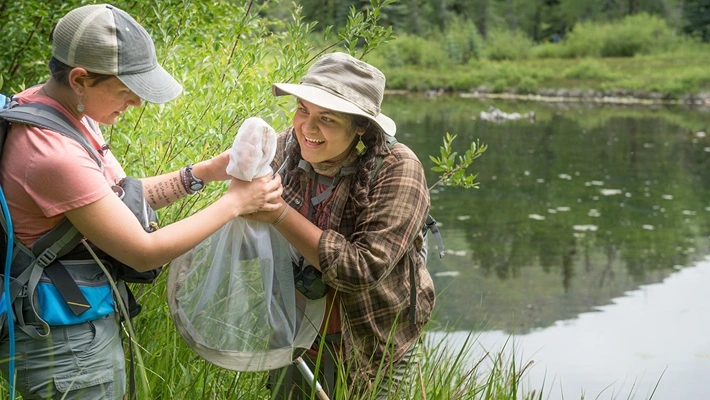
Animal & Conservation Biology
Overview
The Animal & Conservation Biology BSc (Hons) course teaches a comprehensive understanding of animal behaviour, ecology, and conservation. Throughout the course, students will learn how to apply the knowledge to secure wildlife and understand the effects of pollution and climate change on animals.
They will also learn how animals have evolved and adapted to diverse environments in terms of physiology, ecology, and behaviour.
Besides, they will learn about the biggest threats to animals, how to assess their habitats, and ways to protect them. Most importantly, students will gain practical experience through fieldwork, laboratory work, and research projects, preparing them for careers in wildlife conservation, zoology, and environmental management.
Objectives
- Deep understanding of animal behaviour and ecology.
- Gain practical skills in conservation and wildlife management.
- Apply knowledge to address real-world conservation challenges.
Prerequisites
- Strong academic background in Human Biology, Biology, Chemistry or Physics.
- Conservation: Environmental Science and Geography may be considered.
- Adult Literacy and Numeracy are also accepted.
- Commitment to Animal Conservation Science.
- Solid communication and interpersonal skills.
- Desire for positive impact.
Curriculum Outline
- Comparative Anatomy, Physiology and Behaviour
- Biomolecules, Cells and Microorganisms
- Biodiversity, Evolution and Genetics
- Ecology
- Statistics and Field Biology
- Applied Molecular Biology
- Brain and Behaviour
- Sex and Survival
- Landscape Ecology
- Animal Health and Welfare
- Conservation Biology
- Professional Skills for biologists
- Project in Animal Behaviour
- The Social Life of Animals
- Conservation Science in Practice
- Animal Behaviour and Conservation
- Control and Coordination of Behaviour
- Tropical Field Course
- Biodiversity in the Anthropocene
- Conservation and Genetics of Populations
- Coastal Ecology and Ecosystem Services
Teaching Method
- Lectures
- Seminars
- Tutorials
- Field studies
- Laboratory classes
- Independent study
Modules
- Foundation in Science
- Life on Earth
- Comparative anatomy and physiology
- Scientific enquiry
- Introductory Microbiology
- Cell biology
- Genes and Inheritance
- Ecology and Sustainability
- Practical Skills in Biodiversity and Ecology
- Physiology, Adaptation and Disease
- Animal Behaviour
- Option module
- Research Methods
- Habitat Assessment and GIS
- Ecology Field Studies
- Conservation Biology
- Terrestrial Field Ecology
- Option module
- Professional Practice
- Advances in Animal Behaviour
- Current Topics in Ecology
- Project
Assessment Methods
- Examination
- Assignments
- Practical assessments
- Peer and self-assessment
- Computer-based assessments
- Oral, audio-visual and poster presentation
Course Duration
This programme may vary depending on the institutions and countries, but the general standard options in the UK are:
- 04 years (full-time).
Facilities
- Well-equipped lecture halls
- Dedicated laboratory spaces
- Specialised labs for Histology, Molecular biology, Animal behaviour research, and Environmental analysis
- Research centres and institutes
- Well-stocked with scientific journals, textbooks, and reference materials
- Access to digital databases, e-books, and research papers.
- Learning management systems
- Computer labs and workstations
- Microscopes
- Laboratory equipment
- Field equipment
- Animal handling facilities
- Animal care facilities
- Greenhouses and outdoor spaces
- Student union and social spaces
Career Pathways
- Wildlife biologist
- Wildlife conservation
- Wildlife rehabilitator
- Zoo or aquarium curator
- Environmental law
- Environmental consultant
- Ecological consultant
- Research scientist
- Veterinary medicine
- Animal welfare officer
- Animal shelter worker
- Animal behaviourist
- Interpretive ranger
- Science communicator
- Environmental educator
- Laboratory technician
- Data analyst
- Biotechnology researcher
- International conservationist
- Wildlife forensics
- Conservation genetics
- Ecological restoration
- Sustainable development consultant
- University lecturer or professor
- Government agency worker
- Non-profit organisation worker
- Climate change adaptation and mitigation
Fees and Fundings
- Tuition fees are £20,310 per year and may vary depending on the institution.
- Scholarships, grants, and financial opportunities are available.
- Government loan aid is available.
Entry Requirements
- A-levels: BBD – BBB to include C in Biology
- Functional Skills Level 2 in English and Maths
- GCSE English, Maths and Science at C/4 or above
- IELTS 6.5 overall with 5.5 in all skills
- Strong communication and interpersonal skills
- A strong academic record
Field Work and Internships
- Participate in conservation projects, such as reforestation, habitat restoration, and species reintroduction.
- Internships with organisations like the World Wildlife Fund, the Nature Conservancy, or local wildlife trusts.
- Volunteer at local wildlife organisations or nature centres to gain experience.
Certifications
- Certified Wildlife Biologist (CWB)
- Certified Ecological Restoration Practitioner (CERP)
- Geographic Information Systems (GIS)
- Data Analysis Certifications
- First Aid and CPR
- Wildlife Rehabilitation
- Boat Operator Certification
- Wildlife Handling Certification
- Ecotourism Management Certification
Intakes
Typically, it takes twice a year (fall and spring), but may vary like:
- Fall (September/October)
- Spring (January/February)
- Summer (May/June)
Student Testimony
"Couldn't get discretionary funding because the process is not ADHD friendly." Says - "Liv, Animal & Conservation Biology BSc (Hons)."
Frequently asked questions
Animal & Conservation Biology is a multidisciplinary field that explores the biology, ecology, and conservation of animals and their habitats. It combines theoretical knowledge with practical skills to address challenges like habitat loss, climate change, and wildlife trafficking.